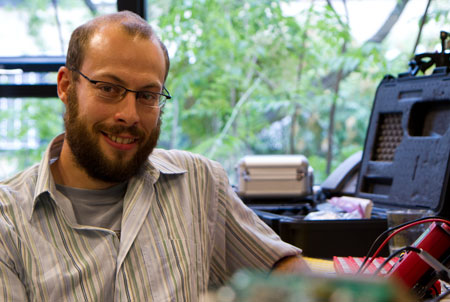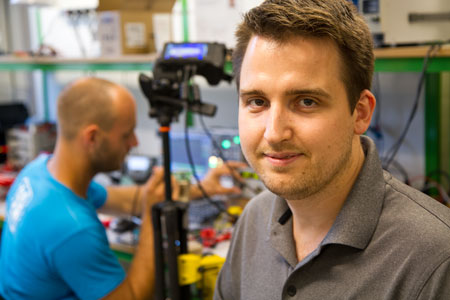Portable computers will soon be able to do away with the power supply transformer, which is currently a necessary—and heavy—accessory in computer bags.
By Bertel Henning Jensen
Using a completely new technology, DTU researchers have created power supplies so small that they can soon be integrated into a wire or an LED bulb fitting so that these too can be made significantly smaller.
The man heading up the project is Arnold Knott, Associate Professor at DTU Electrical Engineering. Together with a group of students, he has developed a technology that fundamentally changes the way power supplies work.

“We have made them work faster so that instead of sending huge energy packages through the system we are now able to send smaller ones. It’s a bit like comparing a truck to a Ferrari—the Ferrari needs to make several return trips, but runs much faster and is much smaller than the truck,” explains Arnold Knott.
He and his team have succeeded in increasing the frequency in the power supplies by a factor of 1,000—and this is only the beginning,” he adds.
In addition to the obvious size advantage for consumers who will have access to products of minimal weight and size, the new power supplies also benefit the environment—they are less reliant on rare earth elements that are often costly and subject to political sensitivity, as they are found in countries that ignore human rights and environmental considerations.
“And the smaller the power supplies, the fewer materials they use. So perhaps, it's better to compare them to a Tesla rather than a Ferrari,” says Arnold Knott with a wry smile.
"The industry has responded extremely positively and the same can be said of the investors and business angels with whom we have spoken. "
Mickey Madsen, PhD student, DTU Electrical Engineering

The development of the power supplies has been so successful that it has led to a business start-up. Nordic Power Converters was founded by some of Arnold Knotts’ students, including Mickey Madsen, PhD student at DTU Electrical Engineering.
We had an invention we knew there was a market for—one that is big and experiencing rapid growth, which is why we felt there was a basis for creating a business. Our power converters have been tested by one of the world’s leading LED manufacturers, and we have received a lot of positive feedback,” says Mickey Madsen, who at the same time as establishing Nordic Power Converters is also working on his PhD focusing on the self-same miniature power supplies.
“The industry has responded extremely positively and the same can be said of the investors and business angels we have spoken with. It is very exciting to create something yourself and be responsible for the company—but the most important thing is to see the technology come onto the market instead of just staying in the lab,” says the young entrepreneur.
Article in DTUavisen no. 8, October 2014.
Small power supplies work by producing a far higher frequency level than standard power supplies. This makes the componentssmaller and more eco-friendly.
Until the end of the year, Nordic Power Converters—which will develop small power supplies—will remain part of Danish Tech Challenge at DTU alongside 19 other hardware start-ups.
Together with DTU Danchip, Servodan, Noliac, Simplight, VisoSystems, IPU and NPC—DTU Electrical Engineering has initiated ‘Tiny Power’—an initiative that will drive future development and integrate the entire technology into a single computer chip. Tiny Power is a project co-financed by Innovationsfonden and the participating parties.
A product is expected to be on sale within 1-2 years.